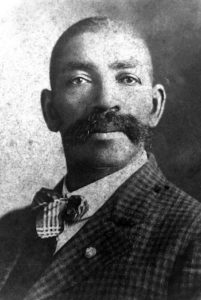
Bass Reeves
*The birth of Bass Reeves is celebrated on this date in 1838. He was a Black farmer and one of the first African Americans to receive a commission as a Deputy U.S. Marshal west of the Mississippi River.
He was born a slave in 1838 in Crawford County, Arkansas. Bass Reeves was named after his grandfather, Basse Washington, and Arkansas state legislator William Steele Reeves owned Bass Reeves and his family. In 1846, his master relocated to Grayson County, Texas, where young Reeves served as a servant to Colonel George R. Reeves, the son of his master. George Reeves was also a Texas legislator and a House speaker in the Texas legislature. During the American Civil War, Bass Reeves fled north into the Indian Territory (now Oklahoma) and lived with the Cherokee, Seminole, and Creek Indians until the end of the war.
After the American Emancipation, Reeves moved to Arkansas and farmed near Van Buren. He married Nellie Jennie from Texas, with whom he had ten children, five boys and five girls. Reeves and his family farmed until 1875, when Isaac Parker was appointed federal judge for the Indian Territory. Parker appointed James F. Fagan as U.S. Marshal, directing him to hire 200 U.S. Marshal deputies. Fagan had heard about Reeves, who was familiar with the Indian Territory and could speak several Indian languages.
Reeves was recruited and became one of the first Black deputies west of the Mississippi River. He was initially assigned as a Deputy U.S. Marshal for the Western District of Arkansas, which also had responsibility for the Indian Territory. Reeves served in that district until 1893, when he transferred to the Eastern District of Texas in Paris, Texas. In 1897, he was transferred to the Muskogee Federal Court. Reeves worked for thirty-two years as a Federal peace officer in the Indian Territory. He was one of Judge Parker's most valued deputies.
Reeves brought in some of the most dangerous criminals of the time, and once, he had to arrest his son for murder. In addition to being a marksman with a rifle and pistol, Reeves developed superior detective skills. Oklahoma became a state in 1907. Reeves, then 68, became an officer of the Muskogee, Oklahoma, police department. He served for two years before falling ill and having to retire. When he retired, he is said to have had to shoot and kill fourteen outlaws to defend his own life.
Often referenced as the character on which the legend of The Lone Ranger was based, Bass Reeves died on January 12, 1910. In 2007, the U.S. Route 62 Bridge at the Arkansas River between Muskogee and Fort Gibson, Oklahoma, was named the Bass Reeves Memorial Bridge in his honor. In 2012, sculptor Harold Holden of Enid, Oklahoma, cast a bronze statue of Reeves at a foundry in Norman, Oklahoma. It was then moved to its permanent location at Pendergraft Park in Fort Smith, Arkansas.